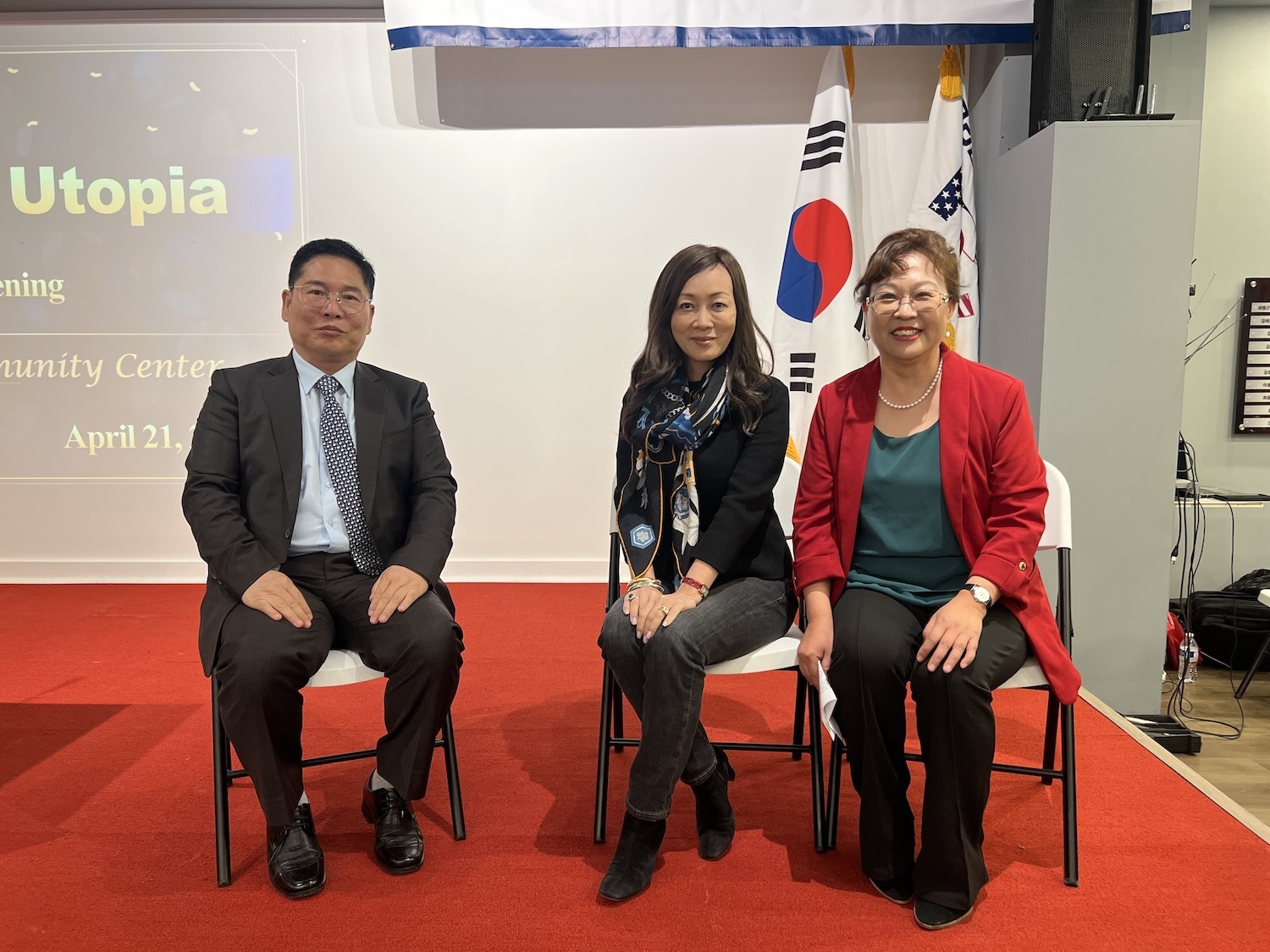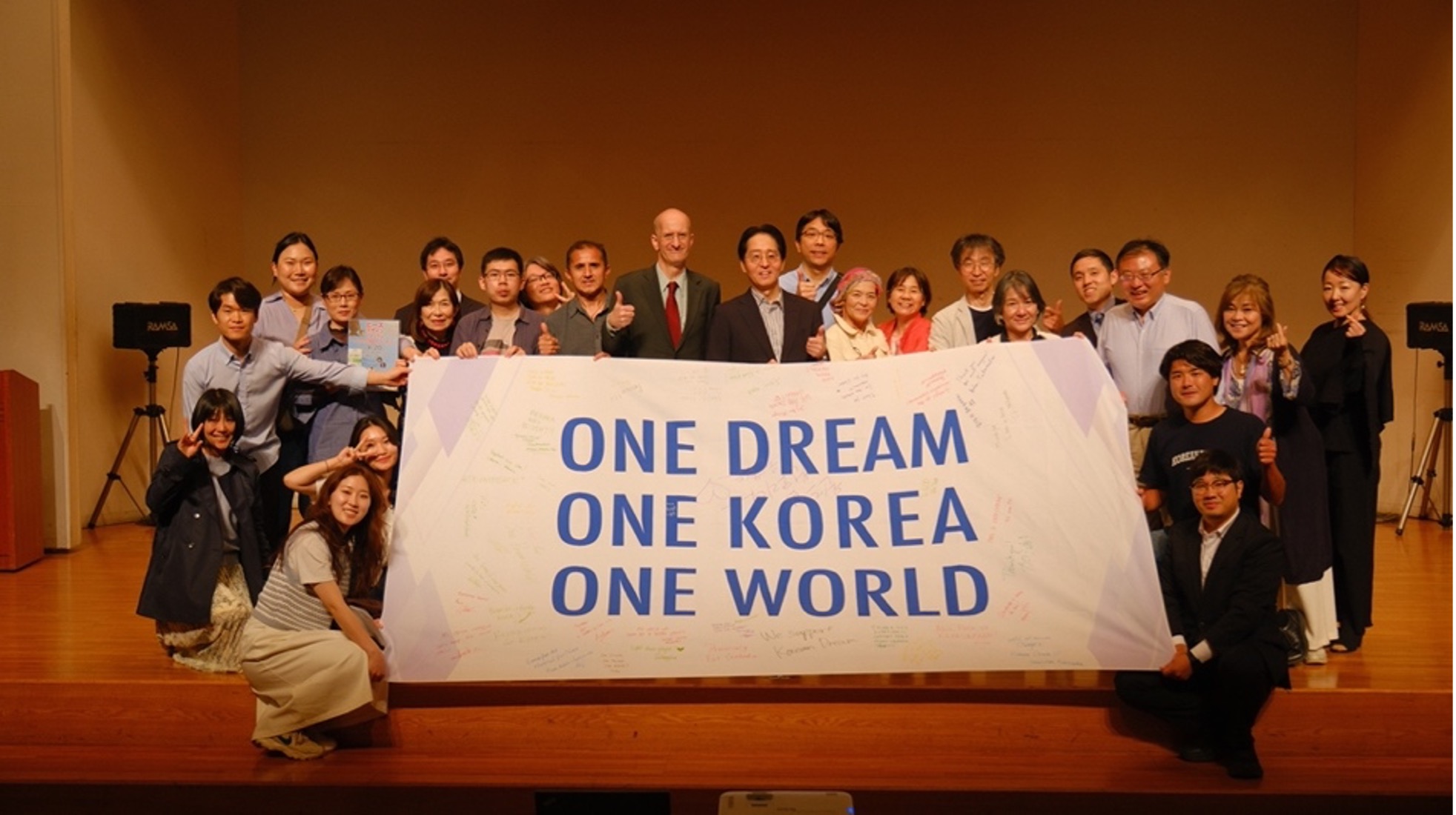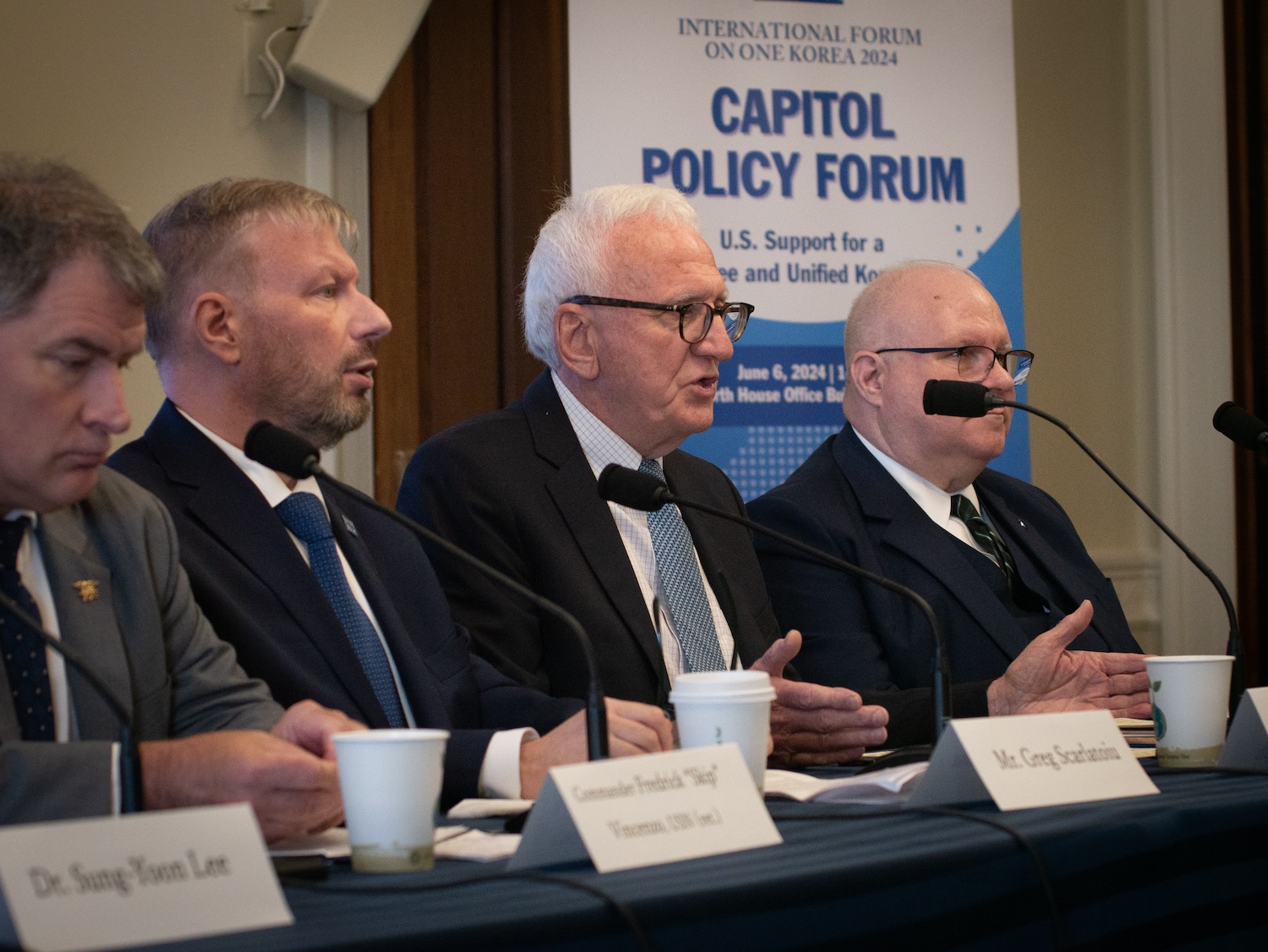
A panel discusses Operationalizing Government and Citizen Support for Korean Unification at the International Forum on One Korea held at the U.S. Capitol.
“The Korea question is the unnatural division of the Korean peninsula,” commented David Maxwell, senior fellow of Global Peace Foundation (GPF) and Vice President of the Center for Asia Pacific Strategy as he welcomed the distinguished panelists and in-person and virtual attendees to the Capitol Policy Forum: U.S. Support for a Free and Unified Korea. He further noted that political leaders have been struggling for 71 years with how to unify North Korea and South Korea, reiterating that global assistance is required to support the peaceful reunification of Korea.
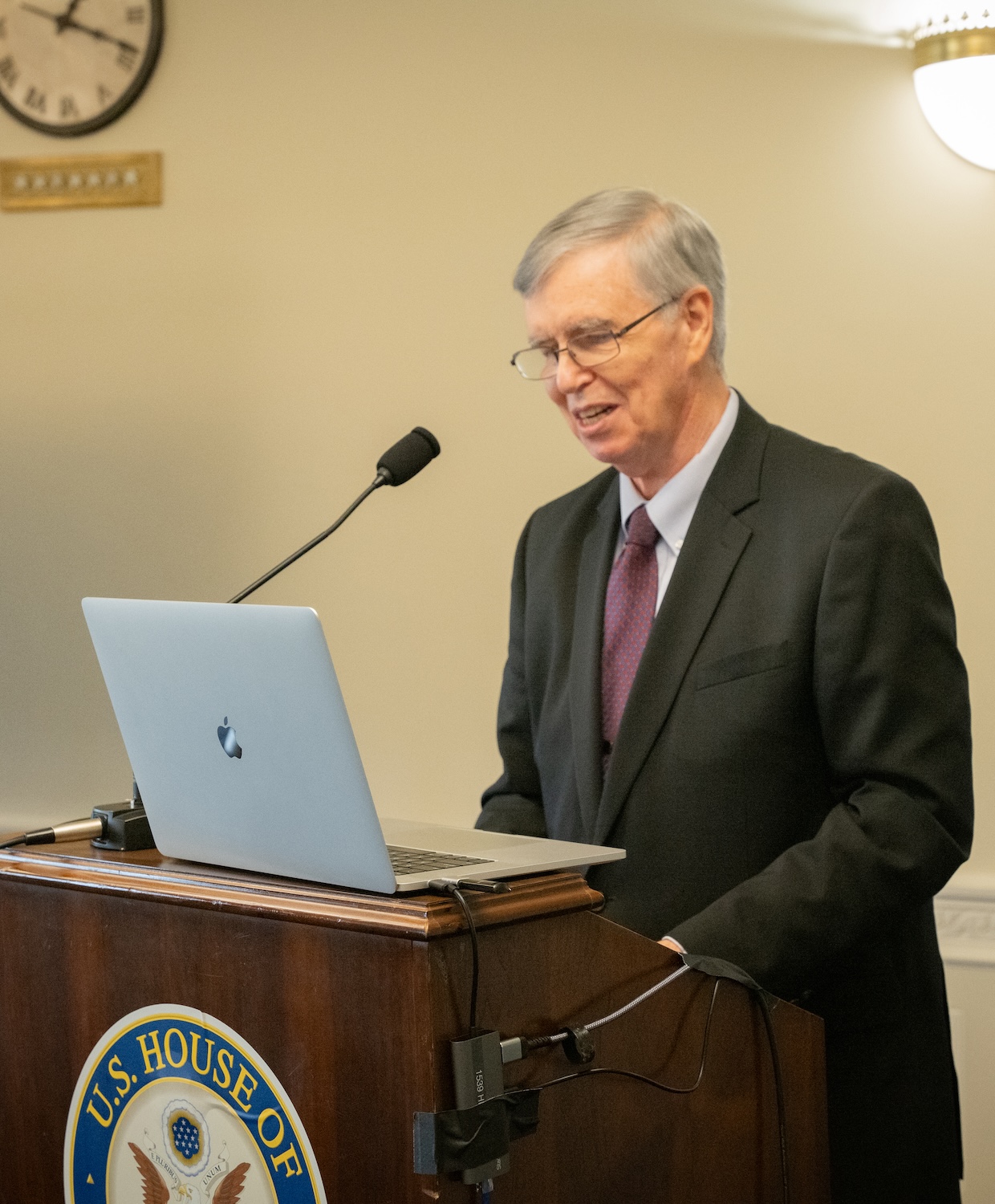
GPF international president James Flynn delivers remarks.
GPF organized the “International Forum: One Korea 2024” held at the U.S. Capitol on June 6, 2024. In his opening remarks, GPF President James Flynn said, “The power of ideas enables us to look beyond the way things are and to see totally different possibilities.” To this end, thought leaders from the U.S. participated in the discussion to develop a comprehensive U.S. strategy for a free and unified Korea centered on two key topics: the economic benefits of unification and the path forward to support the quest for change and peaceful unification through the lens of human rights and information sharing.
Congressman Rob Wittman, a congressional sponsor for the Capitol Policy Forum, spoke on the importance of providing U.S. support to Korean unification saying, “We have to facilitate a platform for North Korean escapees to tell their stories… it’s only with those stories that we can highlight how important it is to reunify the two nations.”
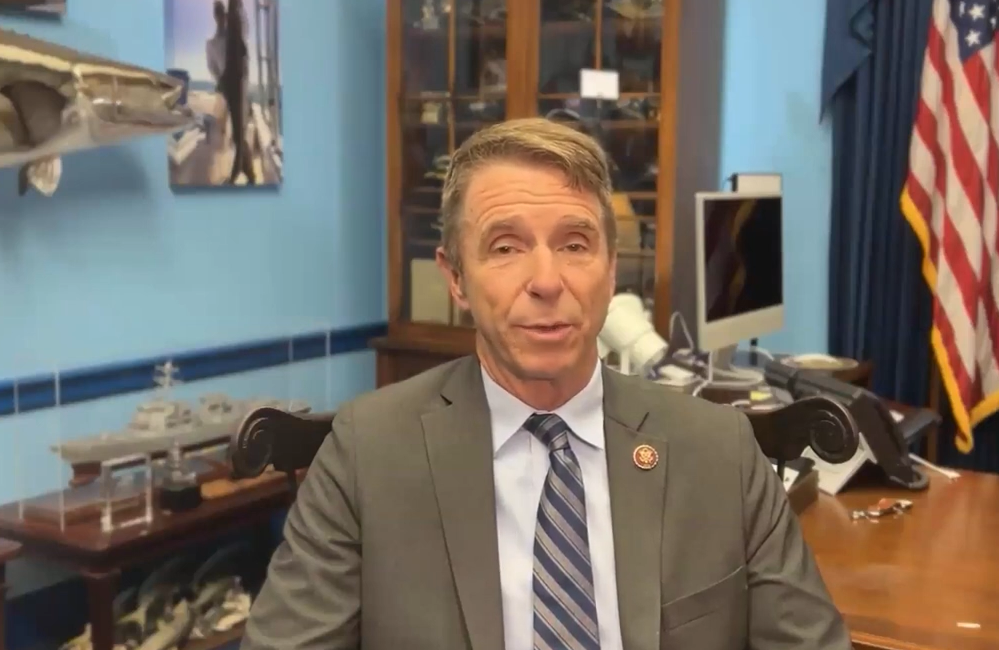
Congressman Rob Wittman delivers video remarks.
Economic Considerations: Opportunities from Korean Unification
Prominent panelists participated in separate discussions on strategies related to the two topics. Mrs. Hee Eun Kim, President and CEO of the Center for Asia Pacific Strategy, moderated the first panel discussion, “Economic Considerations: Opportunities from Korean Unification.” Panelists included Dr. Nicholas Eberstadt, Henry Wendt Chair in Political Economy at the American Enterprise Institute; Dr. Kent Hughes, Public Policy Fellow and former director for the Program on America and the Global Economy at the Woodrow Wilson Center; John Dickson, GPF senior advisor; Professor William Brown, principal, Northeast Asia Economics and Intelligence Advisory LLC and University of Maryland professor; and Dr. George Hutchinson, editor of the International Journal of Korean Studies and member of the board of directors of the International Council on Korean Studies.
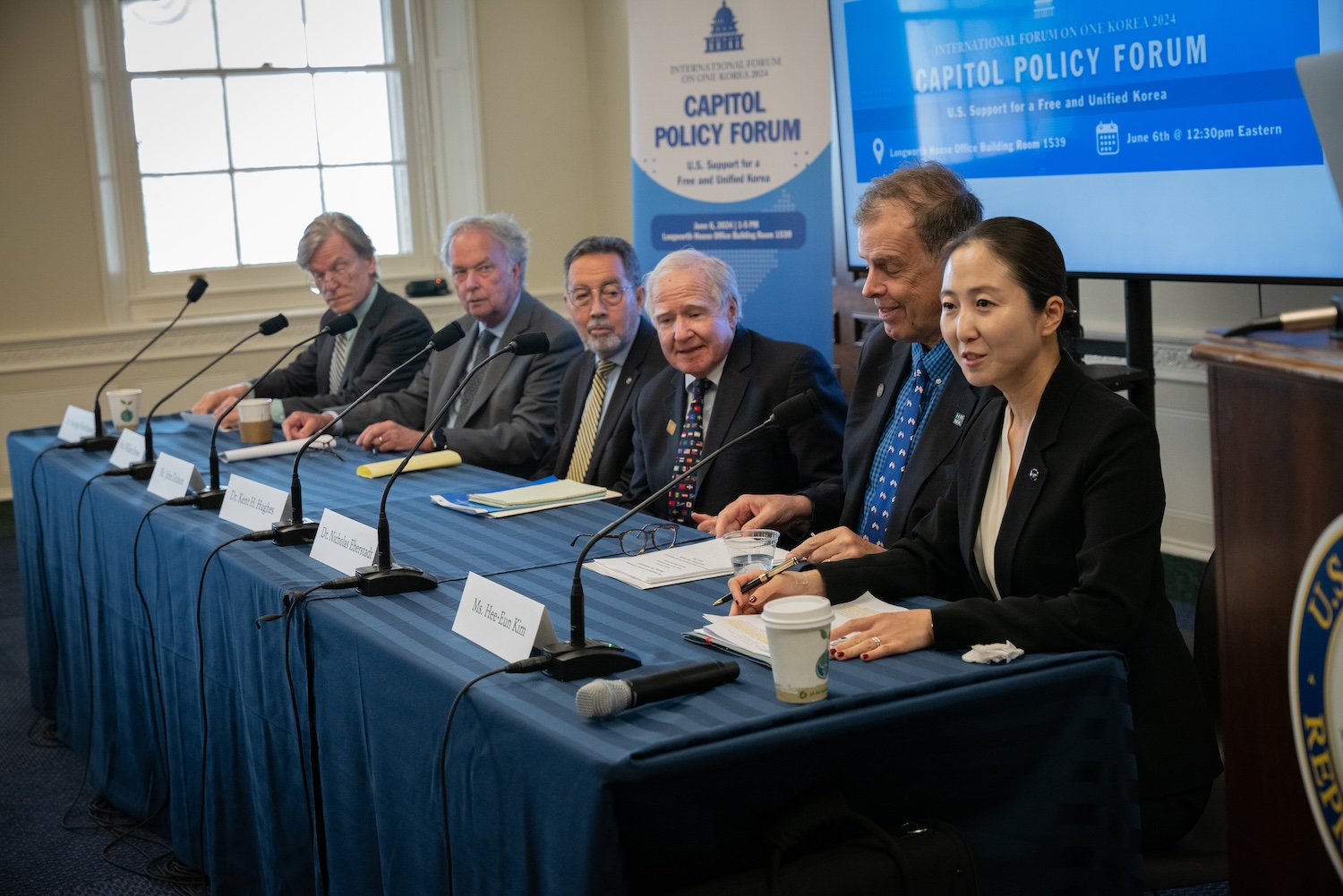
Session 1 panel at the Capitol Policy Forum: Economic Considerations: Opportunities from Korean Unification
Dr. Eberstadt presented “The Economics of Korean Unification: Thinking the Unthinkable,” where he discussed four main points related to the economics of Korean unification: delays increase the size of the task and length of time, “three generations of extraordinary misrule” caused North Korea’s poverty—not its people, investments generating high rates of return can pay for the reconstruction, and a resource-rich South Korea and world community can finance it. He emphasized that while it will be a daunting task, the benefits of unification will be global. According to Dr. Eberstadt, the path to achieving a unified Korea is “unthinkable only if we fail to think about it.”
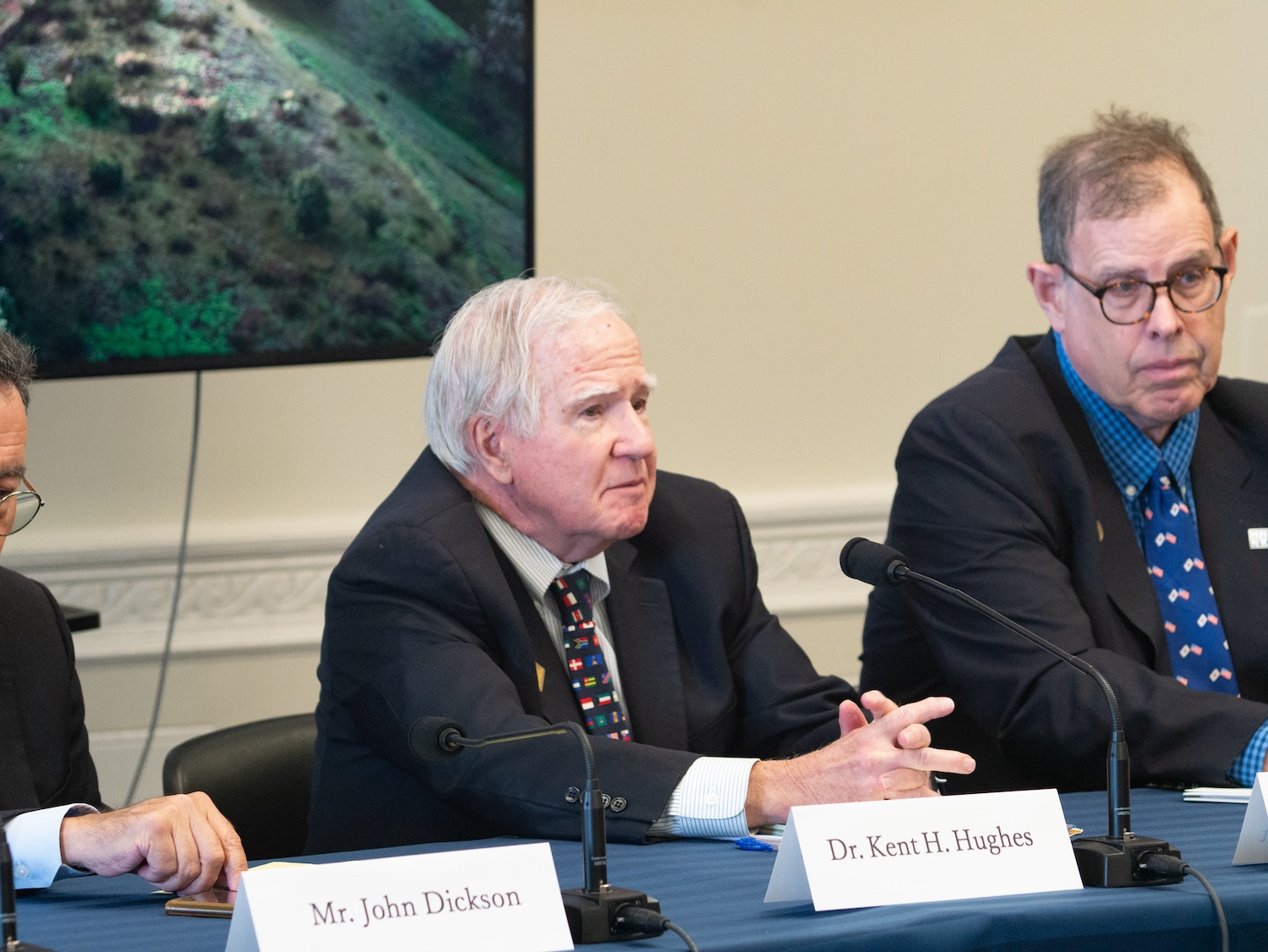
Dr. Kent Hughes speaking at the International Forum on One Korea.
Dr. Hughes reinforced the need to be creative and flexible, look ahead, and be well prepared for unification, as South Korea has the potential to combine with global assistance to achieve this crucial outcome. Mr. John Dickson supported this approach and reinforced the potential role of small and medium-sized enterprises in helping to achieve unification as presented by Dr. Eberstadt. “Isolation is what makes a country dangerous,” said Mr. Dickson. He showcased the idea of eventually building a World Trade Center in Pyongyang. The instant network that the project could provide would open a floodgate of collaboration to invigorate the region and be a model of peace for other tumultuous territories around the world.
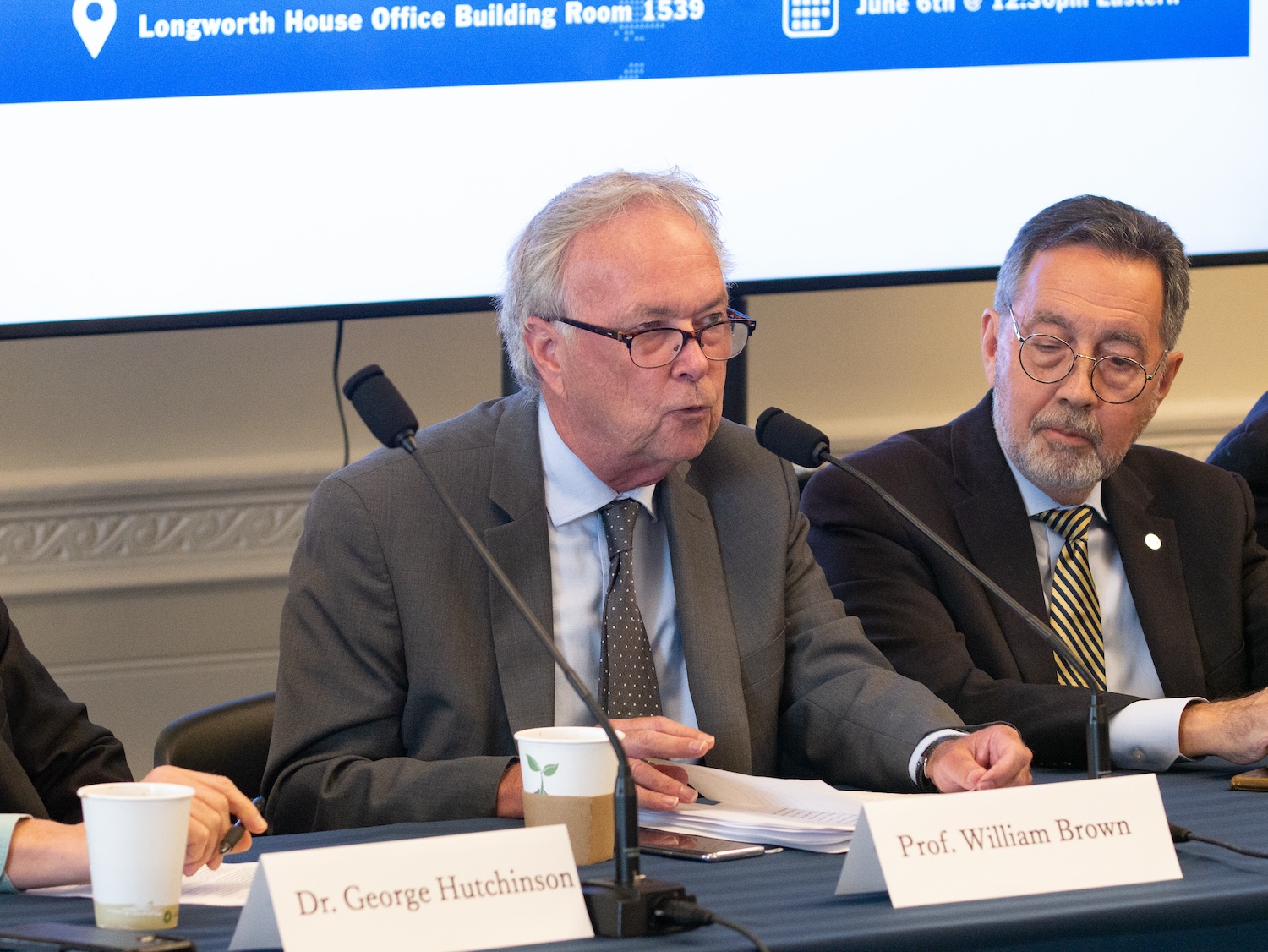
Professor William Brown at the Capitol Policy Forum.
Professor Brown took a North Korean slant and cautioned that “Unification, or a combination of the two Koreas into one free nation, is truly a daunting and dangerous proposition.” He agreed that all of Korea would benefit from an economic integration of North and South Korea; however, the challenge lies in how to make it happen. Professor Brown discussed three essentials for reunification, including decentralization by replacing socialism with capitalism, the creation of a decent money and banking system, and the creation of an ownership society. According to him, information must be pushed to North Koreans on the benefits of unification, and North Korean sanctions should be revised to “penalize bad behavior and reward good behavior.”
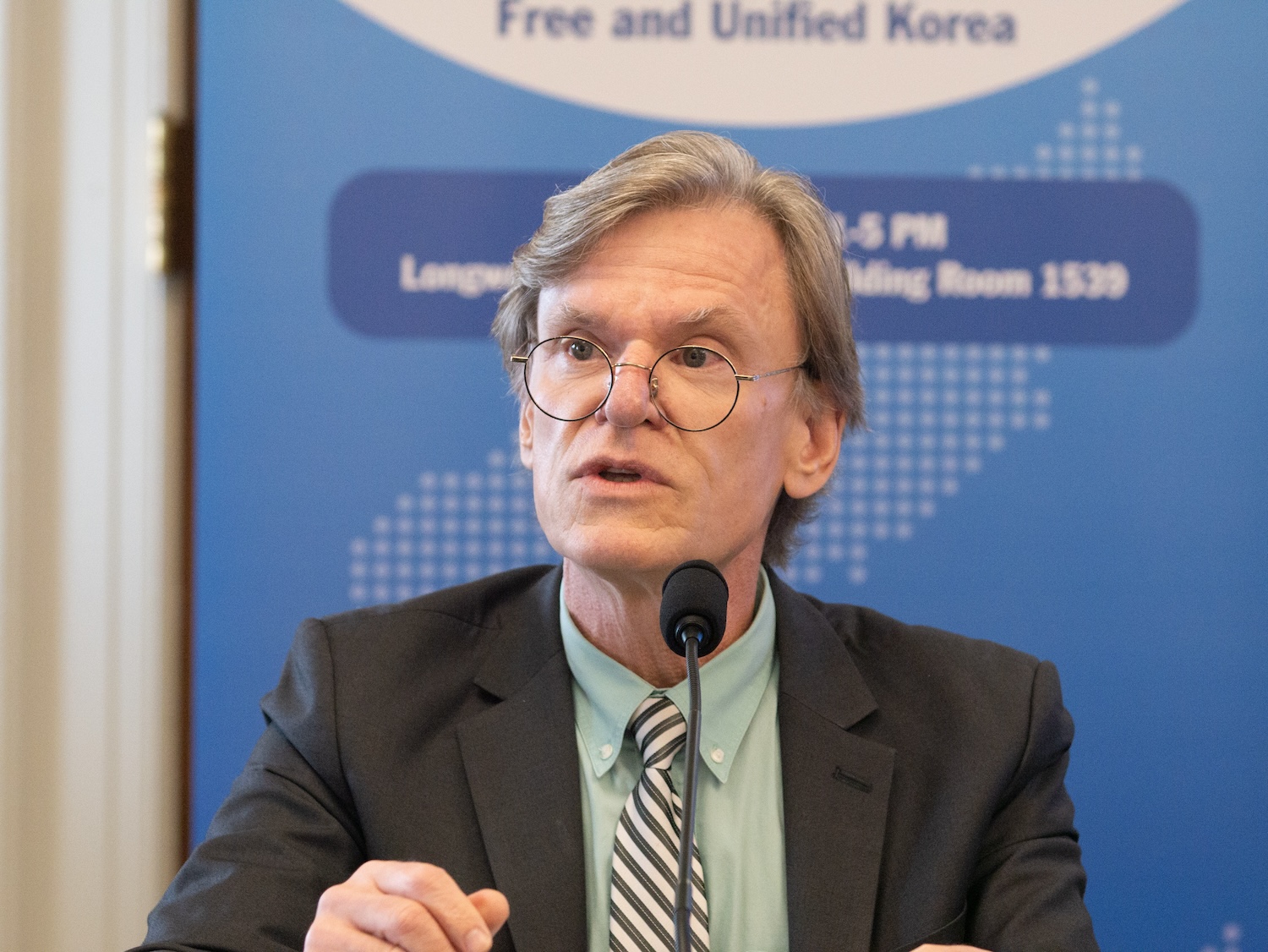
Dr. George Hutchinson
Like other panelists, Dr. Hutchinson agrees that the economics for Korean unification is strong under a peaceful transition. He noted, though, that this is impossible under North Korea’s recently announced anti-unification policy to be enshrined in its constitution and that a more likely scenario is a spontaneous event causing the collapse of the North Korean government. According to Dr. Hutchinson, the South Korean government remains undaunted and has reaffirmed its commitment to unification, outlining three critical tasks to support its effort: raising awareness of North Korea, inducing change in North Korea, and fostering international support and solidarity. Dr. Hutchinson strongly urges U.S. support in assisting South Korea to “create favorable conditions for a free and unified Korea.”

Audience listens attentively to speakers at the International Forum on One Korea held at the U.S. Capitol.
All five panelists agree that South Korea must be the driving catalyst for unification with support from the international community and institutions. Dr. Eberstadt stated, “A free and unified Korea would offer enormous benefits to the world because the economy of the world is not a zero-sum game.” Professor Brown cautions that if unification is to drive economic development, North Korea must be given the opportunity to develop its own companies rather than having outside companies forced upon it. Dr. Hutchinson concurs that now is the best time for unification, with human rights being put up front.
Operationalizing Government and Citizen Support for Korean Unification
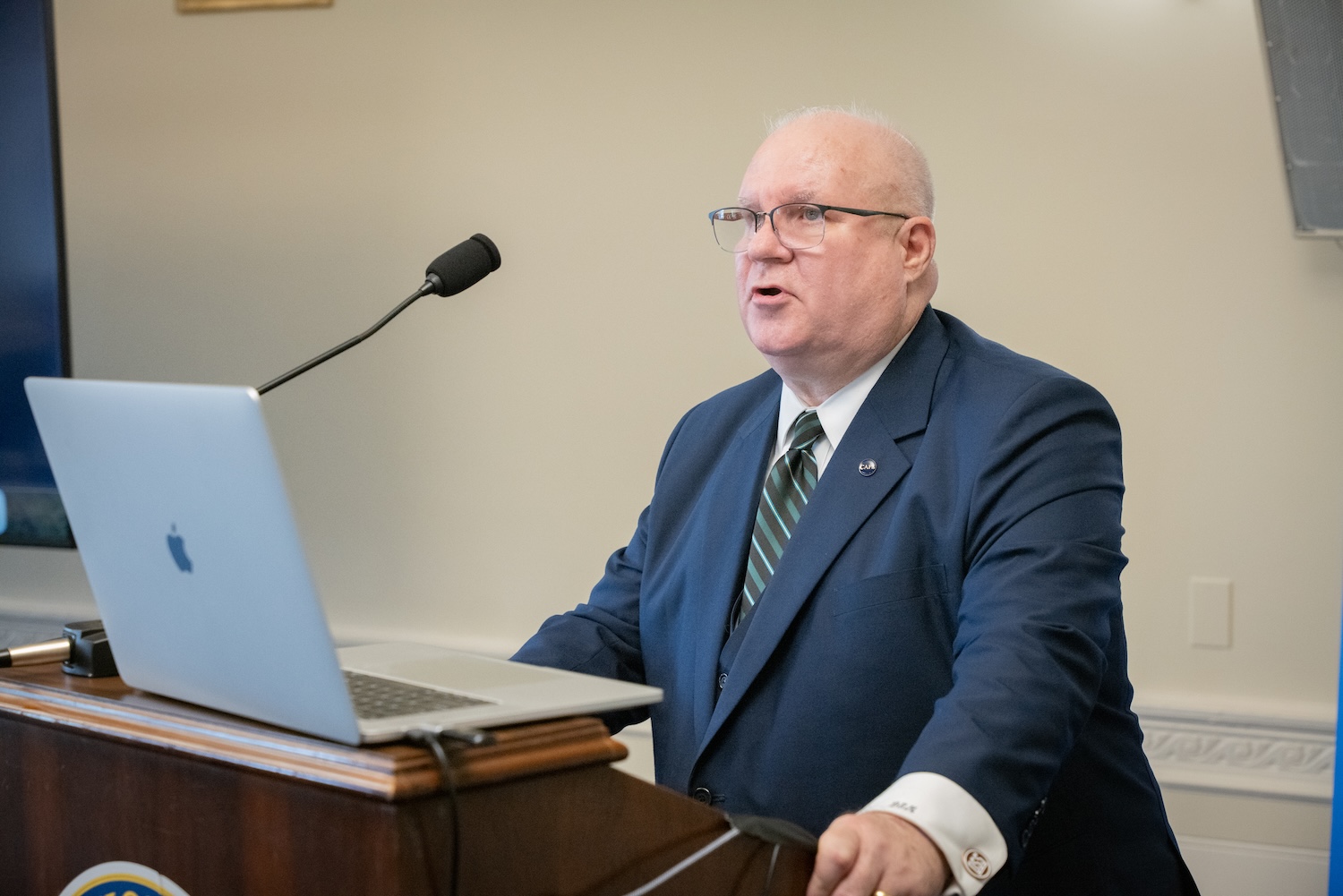
Mr. David Maxwell moderates the session on Operationalizing Government and Citizen Support for Korean Unification.
Transitioning from economic benefits, David Maxwell moderated the second panel discussion “Operationalizing Government and Citizen Support for Korean Unification – Challenges – How to Create Conditions for Change in North Korea.” Esteemed panelists included Ambassador Robert Joseph, senior scholar for the National Institute for Public Policy and former Under Secretary of State for Arms Control and International Security; Greg Scarlatoiu, executive director of the Committee for Human Rights in North Korea (HRNK); Commander Fredrick “Skip” Vincenzo, USN (Ret.) and nonresident senior fellow at the Center for Naval Analyses and the Indo-Pacific Security Initiative at the Atlantic Council’s Scowcroft Center for Strategy and Security; and Dr. Sung Yoon Lee, Wilson Center Fellow.
Mr. Maxwell opened the panel by noting that since 2009, every U.S. President has pledged support for a unified Korea, but ”very little movement has taken place until the current administration.” He also stressed the connection between denuclearization, human rights, and unification. He stated, “The focus on human rights must lead to unification, and only when unification is achieved can there be denuclearization” with information providing connective tissue and the path to one Korea. Agreeing with the panelists from the first discussion, Mr. Maxwell noted that unification is dependent on Koreans solving the “Korea question” which is found in paragraph 60 of the 1953 Armistice which is the unnatural division of the peninsula. This requires support from the rest of the world. He further emphasized that a new strategy depends upon three things: human rights, information, and the pursuit of a free and unified Korea.
Ambassador Robert Joseph discussed the foundational facts that also serve as pillars for the Kim regime: human rights denial, a nuclear program, and unification. To be successful, the three factors must be solved together. He underscored that a fundamental shift in policy is required to create a more comprehensive approach to support a change in the Kim regime.
Greg Scarlatoiu commented that this was in line with the vision of an HRNK founder. He stated, “As a founder of our organization, Dr. Fred Iklè forged a vision to do away with a North Korean nuclear threat by delegitimizing the Kim regime internationally and fostering transformation from within by and through the people of North Korea.” This can be accomplished by telling three fundamental stories: the story of their own human rights, the corruption of the Kim family regime, and the story of the outside world in which both ethnic nationalism and civic nationalism play a vital role.
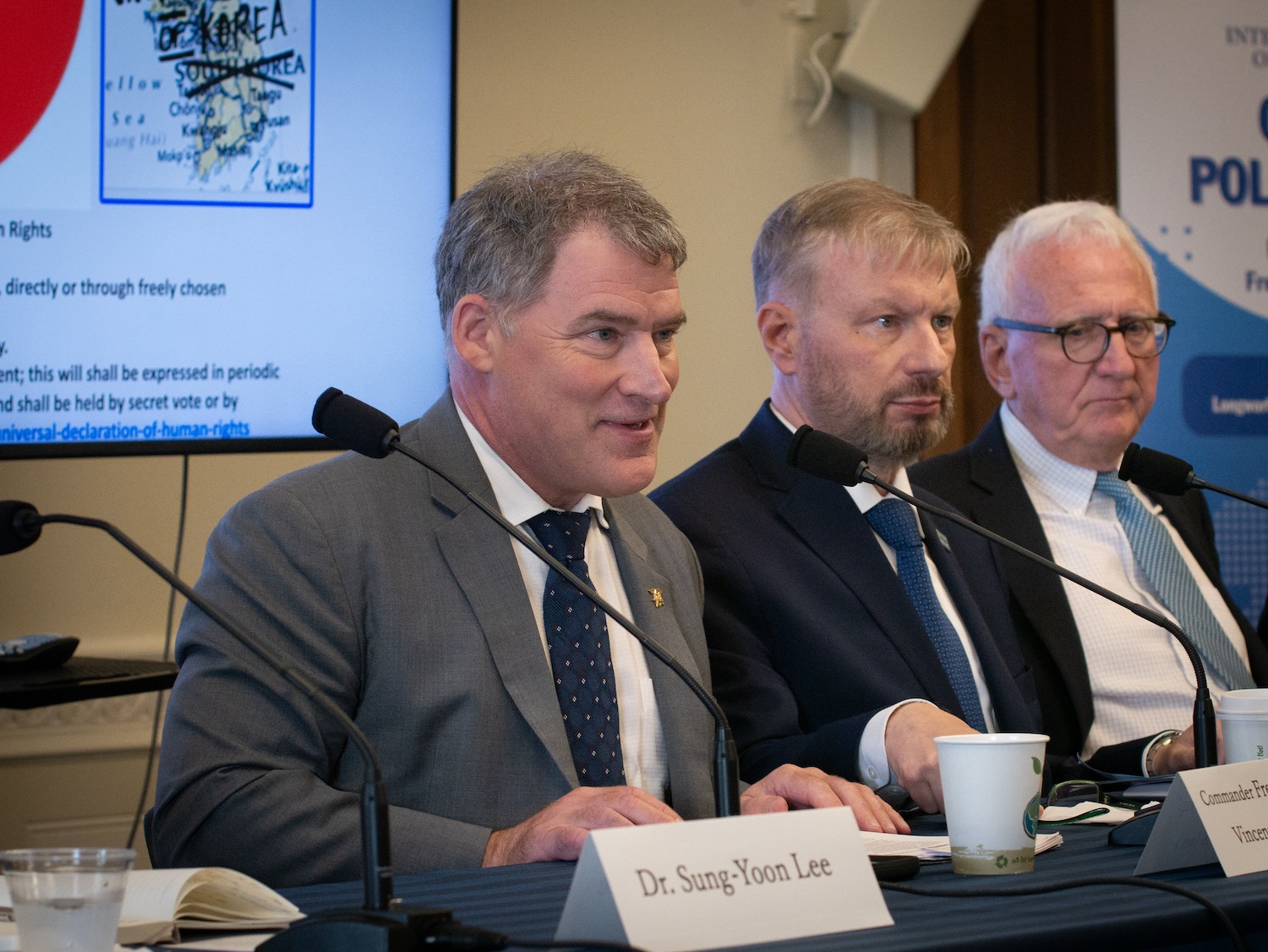
Commander Fredrick “Skip” Vincenzo on the panel: Operationalizing Government and Citizen Support for Korean Unification.
Commander Vincenzo lamented that our North Korean expertise is limited, which grants Kim Jung Un heightened leverage. Agreeing with other panelists, he reinforced the need to consciously bombard North Koreans with an influx of information, commenting “I do think it’s worth considering that it’s time to take an aggressive stand against North Korea in the information space.” He provided an innovative proposal to offer a 10 Point Promise to the Korean people in the north to counter the Ten Points of Monolithic Ideology that forces the Korean people to be obedient to the Kim family regime.
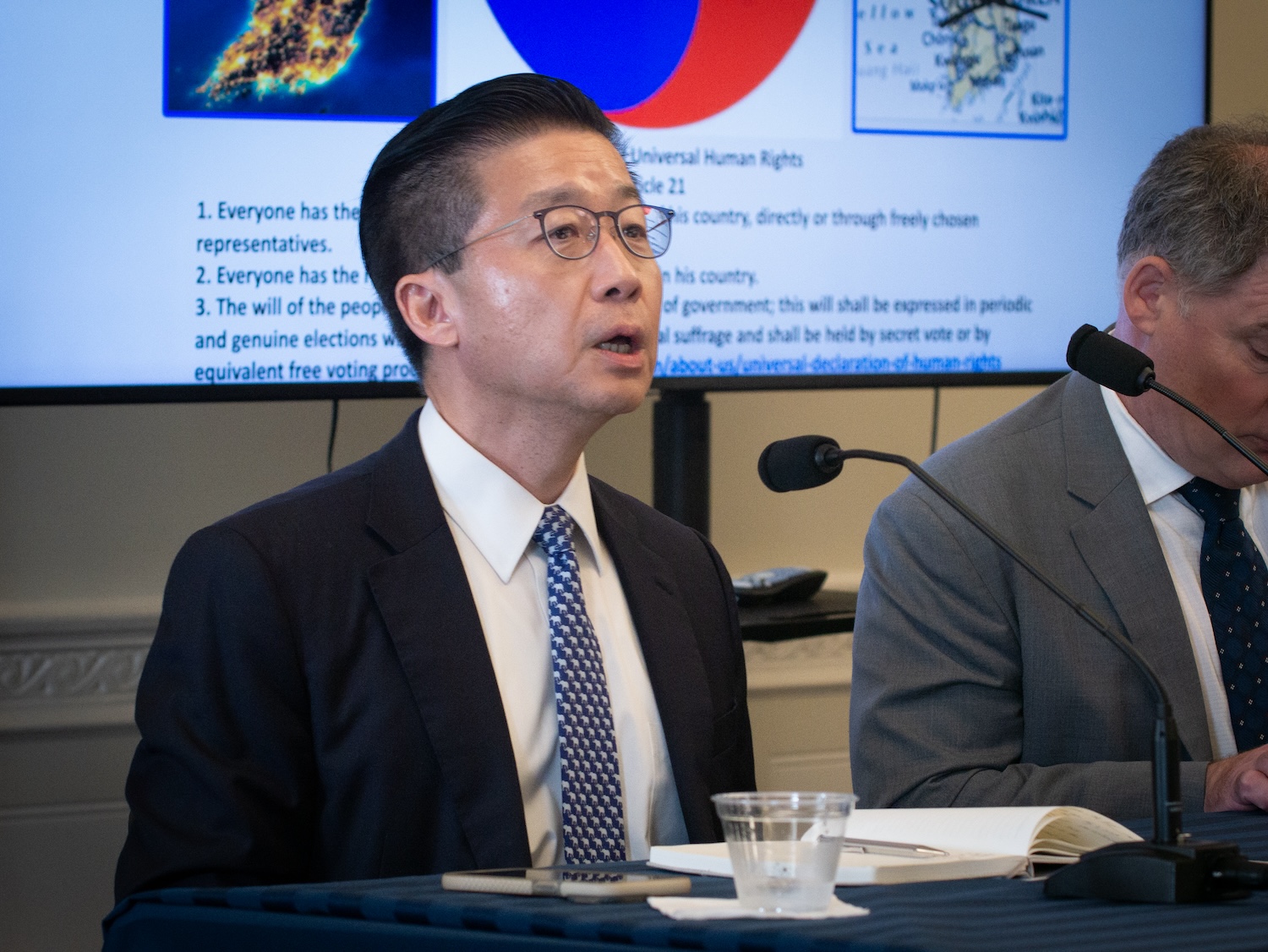
Dr. Sung Yoon Lee speaks on creating conditions for change that will lead to a free and unified Korea.
Closing out the panelists’ formal presentations, Dr. Sung Yoon Lee remarked that 2024 marks the 30th anniversary of the North Korean famine. He noted that he tested and agreed with Dr. Eberstadt’s hypothesis that it is the “first and only instance of an industrialized urbanized literate peacetime economy to suffer a famine.” Dr. Lee articulated that acts of crimes against humanity are foreign to many who live in a democratic society and, therefore, are difficult to empathize with; however, hunger is something to which we can all relate. South Korea must take the lead and tell North Koreans how starvation is a conscious policy of the Kim dynasty.
Human Rights, Information, and a Free Unified Korea
In follow-up remarks, Ambassador Joseph acknowledged that economic, political, military, and diplomatic dimensions are all important and need our attention; however, upfront attention to human rights is the key to unification. According to Greg Scarlatoiu, “Democratic values are at the very core of this civic nationalism that will enable a successful unification. Human rights is at the very core of that set of values.” Commander Vincenzo noted that North Koreans need evidence of a better life through information sharing from North Koreans who escaped, and Dr. Lee cautioned that “We should not underestimate North Korea . . . they have a plan whereas we don’t.”
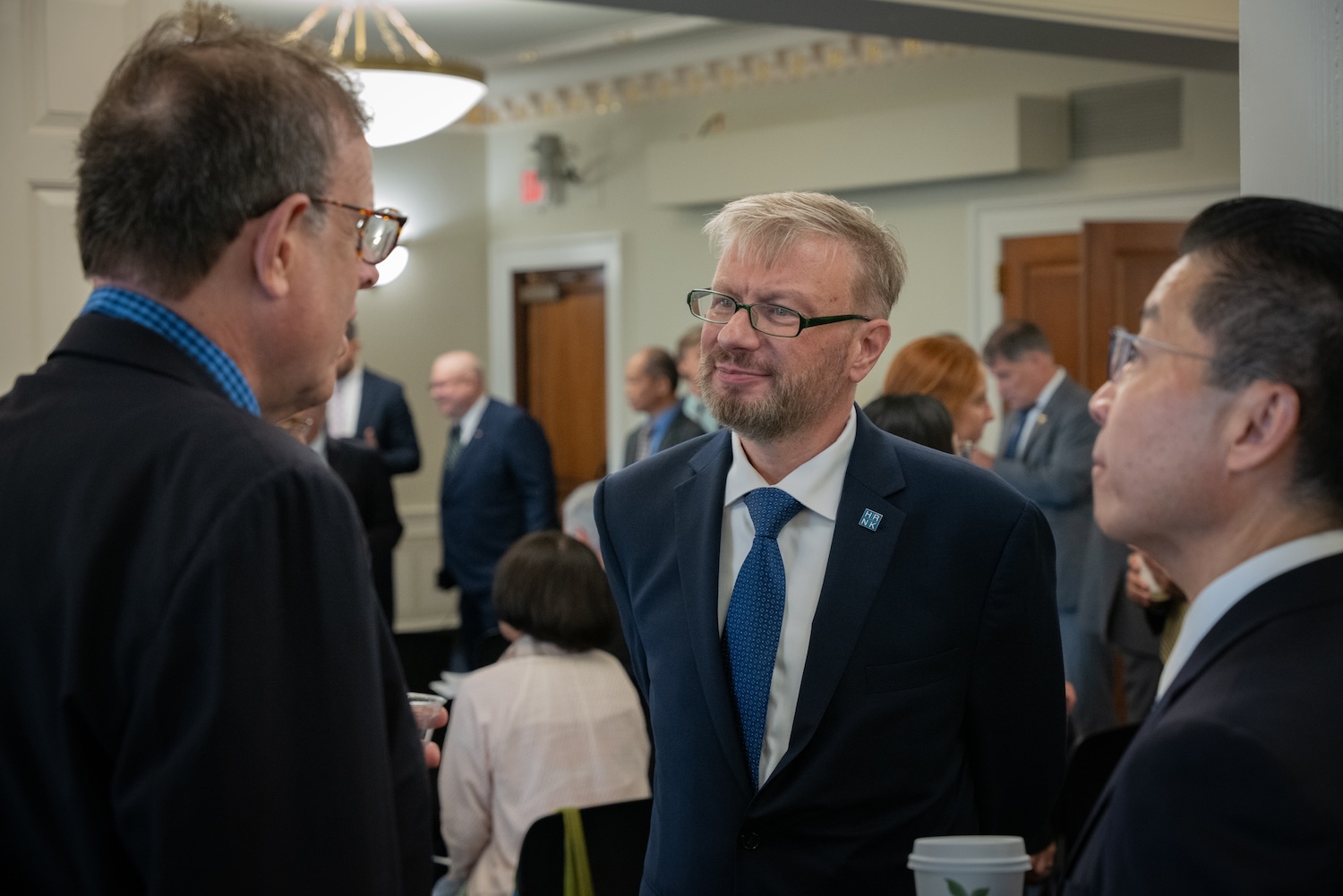
Mr. Greg Scarlatoiu, Executive Director of the Committee for Human Rights in North Korea, speaking with other attendees.
Recognizing the underlying significance of Dr. Lee’s statement, Mr. Maxwell reiterated, “We have to deal with North Korea as it really is, not as we want it to be.” To do so, we must have a deliberate narrative that includes human rights, information, and a free and unified Korea. This includes targeted messages to the North Korean regime elite, second-tier leadership, military leadership, and the general population.
The Capitol Policy Forum: U.S. Support for a Free and Unified Korea highlighted the economic benefits associated with the unification of North Korea and South Korea. While unification will not be an easy task, it can be achieved through preparation, global support, information sharing, and a fervent desire to end human rights abuse in North Korea. As Mr. Maxwell succinctly stated, “We must support the Koreans. The Koreans have to solve the Korea question, but I think we all, as human beings, fellow citizens of the world, have a responsibility to help Koreans help themselves. So, with that, I will say we know one dream and one Korea.”
Learn more One Korea Global Campaign | Global Peace Foundation
View the event page Capitol Policy Forum – U.S. Support for a Free and Unified Korea

